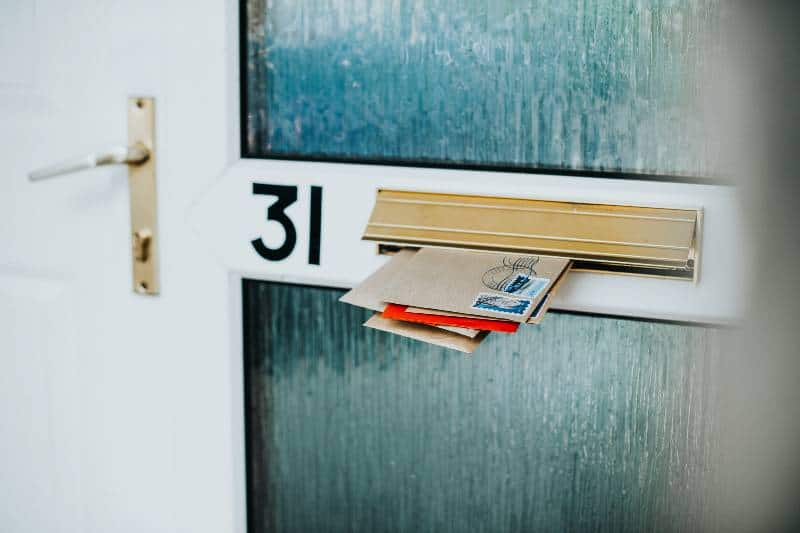How To Maintain A US Address While Living Abroad
When you live in a foreign country, it can be difficult to keep up with your mail. You may not have a permanent address, or you may not want to receive your mail in your home country.
Maintaining a US address while living abroad is helpful for many reasons. It’s important to consider this before moving out of the country, as it can save you time and money in the long run. In this blog we will dive into what options are available – from keeping a physical mailing address in the US to utilizing a virtual mail service, maintaining bank accounts and credit cards back home, and being prepared with all the logistics – so that you can keep your US address while living abroad.
Using a virtual mailbox service that you can activate online is the most practical way to keep a working address in the United States even though you are living outside of the country. For a small fee each month, this service will scan and hold your mail, as well as offer mail forwarding services.
Key Takeaways
- Maintaining a US address while living abroad is beneficial in many ways. It can save you time and money, as well as keep you connected to important mail, such as bills and notifications from financial institutions back home.
- There are various methods available to do this, ranging from keeping a physical mailing address in the US to utilizing virtual mailbox services.
- Be sure to do your research and look into the available options for keeping a US address while living abroad. Making these preparations before you leave will save you time and stress in the long run.

Keeping a Physical Mailing Address in the US
How to choose a reliable friend or family member’s address
The most common way of keeping a US mailing address is to use the address of a friend or family member in the States. You can choose an individual with whom you have a close relationship, and who is not likely to move during the term of your stay abroad. The best candidates are parents or grandparents, who may be retired and living in a fixed location. If you have no such connections, you can also use the address of a trusted friend or acquaintance.
The most important thing is to make sure that your contact will be able to receive mail at their address for several years – even if they move away or change jobs during this time.
How to set up a mail forwarding address
A mail forwarding service does exactly what its name implies: it forwards any mail sent to an old or defunct address to your current address. An alternative to putting your mail service on hold is ideal if you are moving temporarily and don’t want to miss any important correspondence. This is a more convenient alternative to informing everyone who might be sending you mail of your permanent change of address.
Since mail forwarding services typically only last for a limited time, it’s important to make sure that your current address is on file with any organizations that depend on it, such as your bank, the IRS, the DMV, and any retailers whose catalogs you particularly care about receiving. The US Postal Service’s standard mail forwarding service lasts six months, but it can be renewed for a fee.
Requests for a COA must be at least 15 days long for temporary moves. When relocating for a temporary period, rather than having your mail forwarded, you can opt to have it held at your local post office.
A Change of Address (COA) request must be submitted at your local post office in advance of an international move. If you forget to do this before leaving the country, you’ll have to explain the situation in a letter to both your former U.S. Post Office and the foreign postal service that will be handling your mail from now on. This form cannot be submitted electronically.
The US Postal Service is your best and cheapest option for setting up mail forwarding in the US. You may submit a mail forwarding request either in person at your neighborhood post office or online at the USPS website. Setting up a change of address or mail forwarding service at your local post office is free of charge. You can forward your mail electronically by filling out the USPS’s Online Change-of-Address form, but there is a small fee (currently $1.10) for verifying your identity.
How to Use USPS.com to Redirect Your Mail
- Go to the online form for a change of address: To access USPS.com‘s “Quick Tools,” click the tab near the site’s title. Then select the option to “Edit My Address.”
- Disseminate data on who is relocating and for how long: You can indicate on the Change of Address form who is relocating from a given address. If not all of your immediate family members are relocating with you, or if you have roommates who will be remaining at the same address, this will be helpful. Choose whether this relocation is temporary or long-term.
- Set the time that the service will begin: You can tell USPS when to start redirecting your mail by filling out this form. You can choose any date within the next three months, but it must be sooner. Within two weeks of the movement’s official start date, you should start receiving mail at the new address.
- Verify your information and make the small identity validation payment to submit the form. A change of address can also be requested at the post office for no charge.
Pros and cons of this method
If you’re considering setting up a mail-forwarding address, you’re probably wondering what the pros and cons are. Here’s what we see:
Pros:
- If you have a mail forwarding address set up, you can have all of your mail sent to it, and then you’ll get a notification when something arrives. That way you don’t have to worry about missing important documents or bills.
- If you’re traveling a lot or living somewhere for an extended period of time, having a mail-forwarding address can make things easier. You can set up the address, and then have all your mail sent there. This way you don’t have to worry about missing anything important while you’re away from home.
Cons:
- It’s possible that your relatives or friends are located in a state that charges a permanent resident a separate tax. Then there’s a (very) good chance that the state authority where you currently reside will insist that you file a State Return in addition to your Federal Return if you include that address on your Federal Return to the IRS (and even send you a tax bill). It’s possible that you’ll have a fighting chance against them, but it’ll be expensive and time-consuming to actually do so.
- If someone is doing you a favor, you can’t expect them to scan every piece of mail you get and email it to you within the hour (or they may not even know how to do it in the first place).
- Some mail may be forgotten or lost. You may receive some mail several months after it was originally sent. Many of clients have come with a complaint, “I did not receive the mail IRS sent me for many months and I have a huge problem now, please help,” so we are well aware of this issue.
- Also, a mail-forwarding address can be expensive. You’ll need to pay for the service every month, which can add up quickly. If you’re not careful about how long you have the address, then it could end up costing more than simply paying for a post office box in your hometown.
Using a Virtual Mail Service
What is a virtual mail service?
Virtual mail service is a service that allows you to send and receive mail without having to use an actual physical mailing address. The main benefit of using this type of service is that you can keep all your important documents in one place, no matter where you are.
How to choose a reputable virtual mail service
Choosing a reputable virtual mail service is important because it’s the gateway to your inbox. So how do you know which virtual mail service is right for you?
First of all: what are you looking for in a virtual mailbox address service? It can be anything from cost to security to ease of use. If cost is your top priority, then you might want a service that offers unlimited email accounts at a low price. If security is more important to you, look for a site that doesn’t store any of its data in the cloud. And if ease of use is your top priority, look for a site that has an intuitive interface and easy-to-understand instructions.
Once you’ve figured out what matters most to you, start shopping around! Some things to look out for when comparing different services include:
- Security features.
- Third-party audits.
- Any guarantees or warranties they offer.
- The cost of their packages/plans/accounts.
How to set up mail forwarding
First, shift as much as you can to a digital format. You should keep track of your mail and switch as much as possible to paperless billing and electronic delivery before considering mail forwarding or other services.
Credit card statements, insurance policies, and bank statements can all be accessed digitally. Making the switch to email delivery for everything possible is more cost-effective and convenient, even if you end up using one of the mail forwarding or scanning services listed below.
Thankfully, there are many options for outsourcing mail receipts and scanning the outer envelopes before deciding whether or not to open the mail on your behalf. After scanning an envelope, you can choose to have the contents scanned, to have the mail discarded, or to have the contents forwarded to you.
Pros and cons of this method
Here are some of the Pros:
Businesses, like digital nomads, frequently relocate their headquarters. It’s not uncommon for startups to move their offices around as they grow, and for individual departments to do the same. This can lead to a great deal of chaos, and it could prevent vital pieces of mail from reaching businesses. When things need to be shipped between cities, it can also drive up shipping costs.
A digital mailbox is a solution to this issue. Freelancers and small businesses alike can benefit from having a permanent mailing address by using a virtual mailbox. This reduces the complexity and anxiety for business owners so they can concentrate on growing their companies.
Numerous studies have shown that having a neat and orderly workplace encourages productivity. Clutter in the office is a major distraction and makes the space less than ideal for doing work.
Email boxes in the cloud are very useful for this purpose. The use of virtual mailboxes allows business owners to filter their mail and discard any unnecessary items in a safe and efficient manner. In this way, companies are able to eliminate distractions and concentrate on what really matters: expanding their operations as efficiently as possible.
Here are some of the Cons:
It’s possible that some people are hesitant to try out virtual mailbox services due to the added cost. Freelancers and new business owners in particular may feel uneasy about shouldering additional expenses in the beginning stages of their ventures. They could be apprehensive about spending any more money than they already have on things like software, hardware, specialized tools, and general office supplies.
It’s natural to be wary, but keep in mind that a reliable virtual mailbox service can generate significant returns on investment. In fact, once their businesses have matured enough, many of these proprietors will decide to purchase a virtual mailbox.
Keeping Your US Bank Account and Credit Cards Active
How to maintain an active US bank account while living abroad
The only thing you need to do to maintain access to it is changing the address listed on the account to that of a friend or relative living in the United States, and arrange to have your statements delivered to you electronically.
How to use your US credit cards while living abroad
Using a credit card with no foreign transaction fees can be an excellent way to save money on purchases made abroad. With no additional fees for international transactions, you can enjoy more of your spending money while traveling and make the most of every purchase.
Tips for managing your finances while living abroad
When you move, you’ll want to make sure that you still have access to your money. This is required in order to accomplish a variety of tasks, including gaining access to the internet and shopping for groceries. As a direct consequence of this, it is essential to open a bank account as soon as you get to your new nation of residence.
Investigate the various banking options that are open to you, as financial institutions in your new country may be much more reliant on technology than those in your home country.
Whether or not you keep a bank account in your home country open while you are living as an ex-pat is another choice you must make. Depending on how expensive any fees may be, anyone who plans to eventually return to their home country may find it beneficial to keep them open for as long as possible.
For people who have every intention of living permanently away from their home country, the answer to this question is frequently determined by two aspects: the amount of money they owe and how challenging it will be to establish a new bank account if they decide to come back. In either case, you need to give careful thought to how you will organize your international banking transactions.
When you move, you’ll want to make sure that you still have access to your money. This is required in order to accomplish a variety of tasks, including gaining access to the internet and shopping for groceries.
Moving to a new country can come with many challenges, but setting up your financial system should not be one of them! From researching the banking options available in your chosen nation to taking advantage of all that modern technology has to offer – getting yourself set up financially is an essential step on the road towards settling into life in this new home.
Pay off your debts both before and after you leave the country.
Those who use a foreign bank account to make payments on debts incurred in their home countries, such as credit cards or student loans, may discover that doing so results in higher overall costs. In comparison to traditional wire transfers, international money transfers are now much simpler.
On the other hand, the fees associated with these services are typically quite high, and the exchange rates are frequently unfavorable. It can be beneficial to keep an account in your home country in order to pay off debts, provided the banking fees are lower than the cost of a wire transfer or other service.
Be aware that ignoring these obligations is not a prudent course of action to take. Not only are your creditors able to track you down in your new country — in particular, if they also have a presence there — but your credit rating in your home country may take a significant hit as a result of your failure to make payments, which may make returning there financially impossible. Interest and penalties may also accrue, and the creditors may very well begin legal proceedings to recover the debt. Any assets left behind in the country, such as rental property, may be subject to a charging order if the individual does not leave the country.
Make arrangements to pay off your debts either before you move to your new country or as soon as you get there. This will ensure that no bills are forgotten behind, as even though you may have terminated services in your previous nation, you may still have received a bill in your absence that needs to be paid. Maintaining current records of your debts is an important step in ensuring the safety of your finances while traveling.
Filing US Taxes Annually
If you are a resident alien or a citizen of the United States, the rules governing the filing of income tax, estate, and an ex-pat tax return as well as the payment of estimated tax are generally the same regardless of whether you are in the United States or outside the country. According to the Internal Revenue Code, you are required to report all taxable income and pay taxes on it, as well as be subject to taxation on any income you earn from anywhere in the world.
Filing a tax return in the United States is the only way for citizens of the United States who are living outside of the country to receive the numerous tax breaks for which they are eligible, including the foreign earned income exclusion and the foreign tax credit. Publication 54, the Tax Guide for United States Citizens and Resident Aliens Abroad, contains additional information that can be found there.
Even if the accounts do not produce any income that is subject to taxation, taxpayers who are residents of the United States are required to report their ownership of foreign financial accounts to the United States Treasury Department. By the 18th of April in 2022, taxpayers are required to use the BSA E-Filing System to submit an electronic version of the Report of Foreign Bank and Financial Accounts (FBAR). Please refer to the Report of Foreign Bank and Financial Accounts for further information (FBAR).
Virtual currency transactions are taxable under the law in the same way that any other property transaction is, so taxpayers are required to report them to the Internal Revenue Service (IRS) when they file their tax returns. Check out our article on Virtual Currencies for more details.
Explanation of the tax obligations for US citizens living abroad
You are required to file a federal tax return in the United States and pay US taxes on all of your income, regardless of where you live in the world if you are a citizen of the United States who lives outside the country. To put it another way, you are subject to the same regulations regarding the taxation of income as people who live in the United States.
When it comes to taxing people’s personal income, the United States takes an unusual approach. The vast majority of nations operate their economies using either a territorial or a residence-based taxation system.
Individuals are only subject to taxation on income that comes from sources that are earned within the borders of the country that uses a territorial-based taxation system.
Through a system known as residence-based taxation, the country levies taxes on its citizens and permanent residents based on the total amount of income they earn, regardless of where it comes from. (Similar to how the territorial-based system works, nonresidents in these countries are only subject to taxation on income earned within the country.)
The United States of America, on the other hand, is one of only two countries in the world that levies taxes based on citizenship. (Eritrea is the only other country that utilizes this system.) Under this framework, citizens are always subject to taxation based on their worldwide income, irrespective of the location of their primary residence.
How to file US taxes while living abroad
If you are a citizen of the United States or a resident alien (including a holder of a green card) but you currently reside outside the United States and meet the following criteria:
Your U.S. tax return should be mailed to the following address if you are requesting a refund, or if there is neither a check nor a money order enclosed: Department of the Treasury Internal Revenue Service Austin, Texas 73301-0215 USA
Send your completed tax return for the United States, along with a check or money order, to the following address: Internal Revenue Service P.O. Box 1303 Charlotte, NC 28201-1303 USA
Electronic Filing (e-file)
Free File allows taxpayers who have an adjusted gross income (AGI) that is below a certain threshold to electronically file their tax returns without paying a fee if they qualify. Taxpayers whose adjusted gross income is higher than the threshold that has been set are eligible to use the Authorized IRS e-file Provider Locator Service, the Free File Fillable Forms, or the e-file option that requires the purchase of commercial software. There are only a few companies that produce software that is capable of handling addresses in other countries.
Number Identifiant du Payeur (I.D. du Payeur)
A social security number (SSN) or individual taxpayer identification number is required for every person who files a tax return in the United States or is claimed as a dependent on another person’s return (ITIN). Use form SS-5, Application for a Social Security Card, to apply for a Social Security number (SSN).
Contact a local Social Security office or go online to the Social Security International Operations website if you need the SS-5 form or want to find out if you are qualified to receive a social security card. You can get an ITIN by filling out form W-7 and submitting it along with the necessary documentation if you or your spouse do not qualify for a Social Security number.
Resources for getting help with taxes while living abroad
The Internal Revenue Service (IRS) has a special international section on its website that can help you find information about filing taxes from abroad. Use this website to locate an IRS office in your country and get information about any tax treaty between the U.S. and your home country. If you are unable to find an office for assistance, you may be able to contact the nearest U.S. embassy or consulate for help with your tax situation.
Keeping in Touch with Family and Friends in the US
If you’re living abroad, it can be difficult to keep in touch with family and friends back home. But there are a number of ways that you can stay connected:
Use email or Skype to communicate with friends and family in the U.S. Use Google Voice (with a US phone number) or WhatsApp (which is free) to call them for free or very low cost when you have access to WiFi.
If you’re in Thailand and you’re looking for a job, I have written an article here where I discuss the various job opportunities available in the country. I have looked at each sector and laid out all of the different types of jobs that can be had, as well as providing advice on how to go about finding a good job.
Importance of maintaining social connections while living abroad
While living abroad, it’s important to keep up with your friends and family back home.
We know that moving to a new place can be hard, but it can also be exciting and rewarding. Staying in touch with friends and family is one way you can stay connected with the people who are most important to you. You don’t have to do everything together—but it’s nice when you can have a connection with the people who matter most to you, even when they’re far away.
Tips for staying in touch with family and friends in the US
Here are a few tips for staying in touch with family and friends back home:
- Call them. Even if you’re not close with your family, it’s nice to hear their voices once in a while. They’ll probably be surprised that you called and might even invite you over for dinner or something.
- Text them. If you don’t have time to call or mail your parents, at least send them a quick text message every now and then to let them know how things are going.
How to stay informed about US news and developments
There are a lot of ways to stay informed about US news and developments, but here are 5 quick tips that’ll help you make the most of your time.
1. Follow major news outlets on Twitter. You can get real-time updates from trusted sources like CNN and Fox News, plus see what other people in your network are talking about.
2. Use sites like Google News and Yahoo News to look for breaking stories and check in on trending topics. These sites will also give you access to local news from across America—and if you have an interest in one particular city or state (like Chicago or Boston), this can be a great way to stay connected with what’s going on around you!
3. Sign up for newsletters from local newspapers and magazines—they’ll give you a more detailed perspective on what’s happening in your community than national news sources will provide, plus they’re usually free! Just search for “newsletter” on any website that publishes content regularly (like The New York Times), and then click the sign-up button at the bottom of the page—you’ll be good to go!
4. In addition to following individual reporters on Twitter and reading the news on their blogs, you can also follow news organizations themselves. This is a great way to stay up-to-date with important stories as they develop and get an idea of what’s happening in your community!
Staying Prepared
How to renew expiring documents such as a driver’s license or passport while living abroad
When applying for a passport to the United States from outside the country, the process is different than when applying from within the country. When it comes to submitting your final documents and having them processed, each embassy and consulate of the United States has its own set of protocols.
For all passport-related services, you are required to submit your application in person at an American embassy or consulate in the majority of foreign countries. In a select few countries, you might be able to gain access to certain services by sending in a written request. For further information, please visit the website of the U.S. embassy or consulate.
How to contact the US embassy or consulate in your host country
If you are traveling to another country and need to contact the U.S. embassy or consulate, it is important to know how to reach out for help in case of an emergency. Fortunately, the State Department has made this process very straightforward.
To contact a U.S. embassy or consulate, simply visit the website and find your host country or use these direct phone numbers: For callers in the United States and Canada, dial 1-888-407-4747 while overseas calls can be made by dialing +1 202-501-4444 internationally. With just a few simple steps, you can receive quick assistance from the U.S. State Department abroad!
Tips for staying prepared for emergencies while living abroad
Whether you’re traveling for business or pleasure, it’s always a good idea to be prepared for the unexpected. Here are some tips for staying prepared while living abroad:
1. Make sure your passport is up-to-date and has plenty of space for stamps!
2. Get acquainted with the local emergency number and know how to reach someone in case of an emergency.
3. Check your insurance coverage and make sure that your policy covers any emergencies that may arise while abroad (and check with your credit card company too!).
4. Prepare an emergency kit with all the essentials like bottled water, food, first aid supplies, flashlights, batteries, etc.
5. Find out if there are any local businesses or organizations who can help you if something happens while you’re in their country—like embassies or consulates or even embassies of your own country who may have connections there but might not be able to help directly themselves.
How To Maintain A Us Address While Living Abroad FAQs
Do I need a US address if I live abroad?
It is critical to have a residential address in the United States, even if you are currently living in a region of the world with reliable mail delivery. Even if your place of business is not your official residence, many companies and even some government services require you to have one.
How do I keep my US number when moving overseas?
There are a few different ways in which you can maintain your American phone number. The first thing you should do is inquire with the company that currently services your mobile phone about whether or not they provide a feature that allows you to temporarily “suspend” your phone number.
T-Mobile customers have the option to temporarily suspend their lines twice a year for a period of up to three months during each of these periods. They will continue to charge you a monthly fee basis to keep your number.
Because the majority of people move abroad for longer than six months, this information is not applicable to our situation. During the time that the line is suspended, you will not be able to receive any texts or phone calls.
Google Voice is, in my experience, a superior option to the solutions offered by the majority of national American cell phone service providers when it comes to maintaining a US phone number while traveling outside the country.
What exactly is Google Voice, though?
Google Voice is a Voice over Internet Protocol (VoIP) service that was introduced approximately ten years ago. It gives users the ability to register for a free additional phone number that can be linked to their existing one. Users can send and receive text messages through the Google Voice app, and calls that are made to the second number are forwarded to the primary number.
You will be able to make calls, receive calls, send texts, and receive texts just as you would normally through the Google Voice app, which is available for both the iPhone and the Android. If you port your number to Google Voice, you will have this ability.
Voice over Internet Protocol, which is what Google Voice is short for, is referred to as “VoIP.” That means that all calls are made through the app utilizing data from your new foreign cell phone service provider (unless you elect in the settings to make them through your carrier) or through wifi if you don’t choose to make them through your carrier.
Because the majority of international cell phone networks include generous amounts of data with their most basic plans, this translates to the fact that as long as you only use Google Voice with data, all of your calls and texts with the United States will be completely free.
You also have the option of porting your current phone number over to Google Voice to replace the second number that they provide you with. This is the best option for people moving from the United States to another country.
Can I lose my US citizenship if I live abroad?
One of the many advantages of obtaining citizenship in the United States is that it is a secure status. It is not possible for U.S. citizen to lose their citizenship solely as a result of living outside the United States for an extended period, as is the case for lawful permanent residents who hold green cards. However, there are nuances and exceptions to which one must pay attention.
Can I have a US bank account if I live abroad?
It is possible to open a bank account in the United States if you are a citizen of the United States who resides outside the country. You will need to submit your application to financial institutions outside the United States that are willing to work with US citizens. In addition to this, you will need to ensure that you continue to have the US-based ties that the bank requires and that you can pass the bank’s standard identity verification and compliance procedures.
How do I keep my US cell number?
If you port your current United States phone number to a virtual phone service provider, you will be able to keep using it. Because they use the internet to facilitate business communication, US virtual phone numbers are easily usable overseas. This is because US virtual phone numbers can be an ideal business solution.
Conclusion
So, how can you maintain your US address while living abroad? We’ve covered the most important topics like keeping a physical mailing address stateside, choosing a reputable virtual mail service, setting up modern mail forwarding, and keeping your US bank account and credit cards active. But this is only a brief overview and if you want to know more then might be advised to seek out professional legal or tax advice. Living overseas can create some unique financial implications which should always be double-checked with expert advice before continuing.
Moreover, we urge readers to reach out in the comments section below or subscribe to our newsletter for the best information about living in Thailand and maintaining a US address from abroad. By reading this blog post and interacting with others, you’ll be able to find helpful solutions for preserving your physical mailing address in the USA and more!






